Glossary of fabrics, materials, and knit
Fabrics refer to any flexible material made from natural or artificial fibers (yarn or thread) that is weaved (longer threads, called the warp, are interlaced), knitted (loops of yarn are interlaced), crocheted (loops of yarn are interlaced), knotted (yarns are knotted together), felted (fibers are mat pressed together), or braided (threads are twisted together). Fabrics may be classified by the yarn or thread material or by the method used to create the fabric (or both). Below is an encyclopedia of common and uncommon types of fabric.
1- Acetate
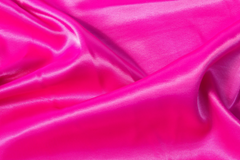
Fabric made from spun cellulose fibers taken from wood pulp and combined with acetic acid. Acetate fabric has a luxurious appearance with excellent drapeability and softness. It is resistant to shrinkage, moths, and mildew and is commonly used for blouses, dresses, linings, and special occasion apparel.
2- Antron
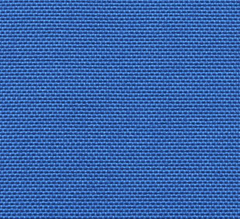
Antron fabric is the DuPont brand of Nylon fabric. It is known for its high strength, abrasion resistance, durability, and versatility. Antron is commonly used for knitwear especially tops and socks.
3- Bamboo
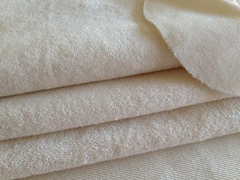
Bamboo fabric is a natural fabric made from fibers of bamboo grass. Bamboo fabric is extremely resilient and durable while feeling beautifully soft to the touch. It is more absorbent than cotton, breathable, thermo-regulating, hypoallergenic, UV protective, and biodegradable. It is often blended with cotton, hemp, or Lycra and commonly used for socks and bed linens.
4- Bisso
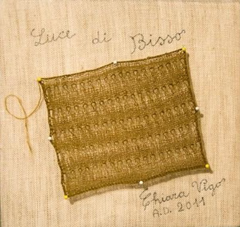
Also called Altar Cloth, Bisso is a type of fine linen.
5- Blend
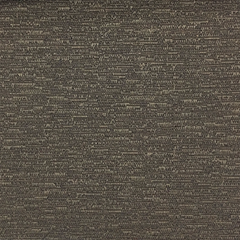
Any fabric constructed from more than one fiber. Two or more fibers are spun together to form the yarn. A common blend is Cotton/Polyester. Read more about fabric blends and their benefits here.
6- Boiled Wool
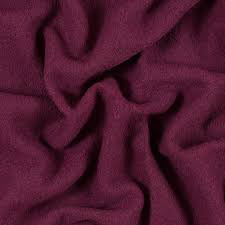
Boiled wool is a wool fabric that has been boiled in water to create a thick, dense, highly durable smooth fabric used for hats, bags, scarves, vests, cardigans, coats and jackets.
7- Boucle
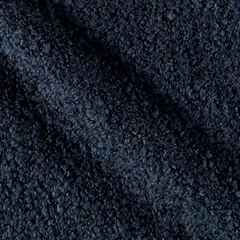
A yarn of fabric made from a length of loops of similar size creating a surface covered with tiny circlets or large curls. The fabric is created by combining two strands with one strand tensioned tight and the other tensioned looser as it is being plied. Boucle fabric is commonly used in sweaters, cardigans, socks, and jackets.
8- Carbon-infused
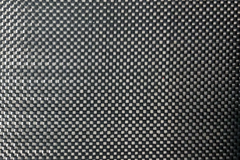
Burned wood product (e.g. bamboo) through carbonization is blended with synthetic fibers to create a durable fabric. Commonly used in sports clothing.
9- Charmeuse
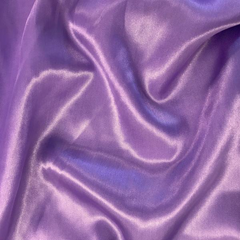
Fabric woven with stain weave in which warp threads cross over four or more weft threads. Surface of one side is smooth, reflective while the surface of the back side has a dull finish. Charmeuse fabric is a lightweight, soft, smooth fabric, often made from cotton, silk, or synthetic fibers and used in dresses, gowns, lingerie, and blouses.
10- Chenille
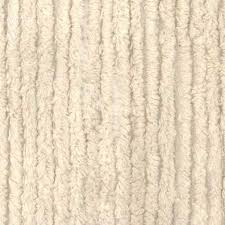
Soft, fuzzy cotton or blended fabric made to resemble the Chenille caterpillar. Typically made from cotton but acrylic, rayon, wool and silk chenille fabrics are common. Chenille fabric is excellent for scarves, towels, and shawls.
11- Chiffon
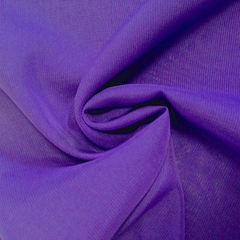
A lightweight, sheer fabric made from silk, polyester, rayon, or other fibers and woven with alternate S and Z twists crepe to create a twist in the crepe. The twist gives the fabric a puckered, slightly rough surface in both directions after weaving. Chffon fabric is often used for dresses, lingerie, scarves, and evening gowns.
12- Chino
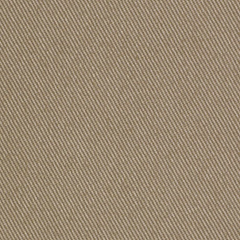
Chino is a sturdy, twill fabric typically made from 100% cotton but sometimes made from blended fibers and commonly used in construction of khaki pants.
13- Chintz
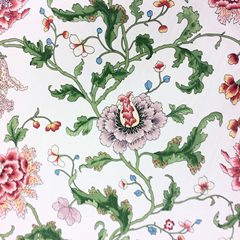
Chintz is a glazed weave fabric typically with bright colors and prints, often floral prints, on a light background.
14- Combed Cotton
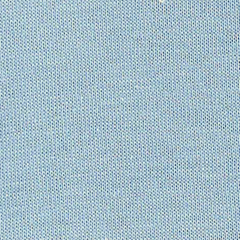
Combed cotton fabric is a fabric made from cotton fibers that have been carefully combed to filter out or sieve small and short length fibers resulting in a smooth cotton-based fabric.
15- Coolmax
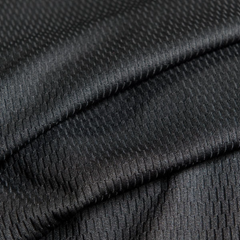
Coolmax is the brand name for a series of polyester fibers that are marketed as moisture-wicking and breathable. The cross section of the fabric fibers is non-round, increasing the surface area by about 20% in order to produce a wicking effect via capillary action.
16- Corduroy
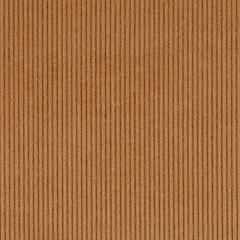
Corduroy is a durable pile fabric with a distinct cord pattern of tufted cords with a channel between the tufts. It’s often made from cotton and is akin to a rigid form of velvet with lengthwise ridges cut into the pile (called wales).
17- Cotton
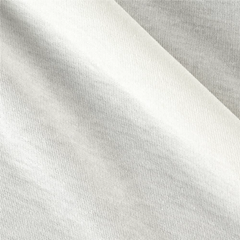
Cotton fabrics are fabrics made from natural cotton fiber. The longer staple fibers (e.g. Pima and Egyptian varieties) are used to produce the highest quality cotton fabrics.
18-Cotton jersey knit
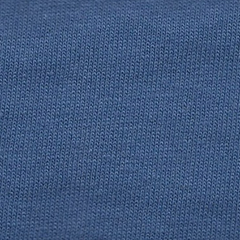
Cotton jersey knit fabric is a very common type of knit for cotton fabric. It’s a soft fabric often designated by weight (from 5oz to 12oz).
19- Cotton Ribbed knit
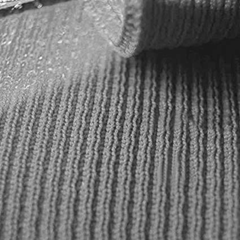
Cotton thermal knit fabric is a textured knit fabric (typically a waffle knit) that is used for garments requiring thermal retention properties.
20- Cotton Lycra knit
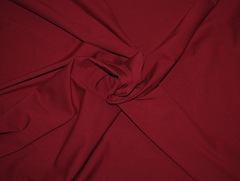
Cotton Lycra knit fabric is a knitted fabric comprised mostly of cotton with a small amount of Lycra weaved in to add stretchiness with good recovery.
21- Cotton spandex knit
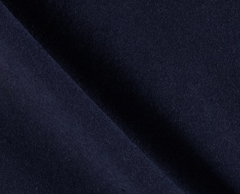
Cotton Spandex knit fabric is a knitted fabric comprised mostly of cotton with a small amount of Spandex weaved in to add stretchiness with good recovery.
22- Cotton interlock knit
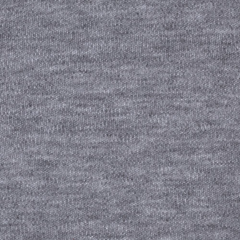
Cotton interlock knit is a cotton-based variant of rib knit construction. It’s similar to jersey knit except both front and back of the fabric have identical appearances.
23- Cotton Lisle
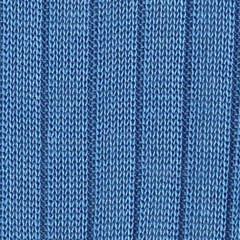
Cotton lisle is a cotton-based fabric used mainly in underwear, socks, and gloves. The cotton fibers are high quality and the fabric hard-spun from a two-ply cotton yarn that is treated to remove all short fuzzy ends leaving a smooth finish.
24- Damask
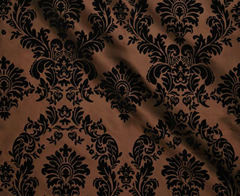
Damask fabric is a reversible figured fabric of silk, wool, linen, cotton, or synthetic fibers with a pattern formed by weaving. Damask fabric is woven with one warp yarns and one weft yarn to create jacquard-woven floral or geometric patterns.
25- Double Knit
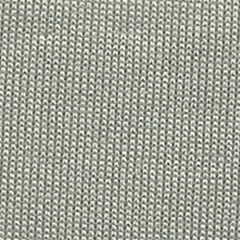
Double knit fabric is a fabric made from two layers of loops with the two layers woven together to create a more stable knit that cannot separate.
26- Ecosil Polyester
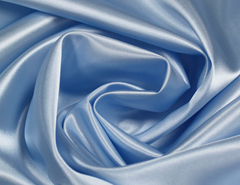
Ecosil is a fabric in which the polyester fibers are spun compactly to give the fabric surface a smooth appearance that is resistant to piling.
27- Egyptian cotton
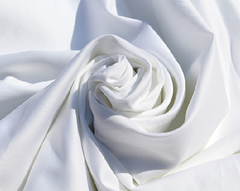
Egyptian cotton fabric refers to fabric created from Egyptian cotton. Egyptian cotton is an extra long staple (ELS) cotton produced in Egypt where the climate allows cotton to grow longer, up to 2-inches in some cases.
28- Elastane
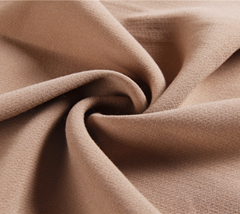
Elastane is a synthetic fiber known for its exceptional elasticity. It is branded under the names Lyrcra and Spandex (an anagram for the word “expands”).
29- Eyelet
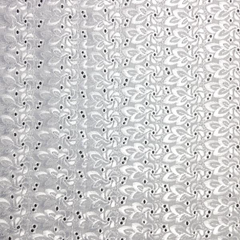
Eyelet is a type of cotton or synthetic fabric with stitching or embroidery sewn around patterned designs in order to prevent the fabric from raveling.
30- Faille
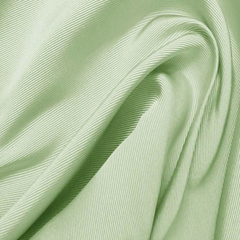
Faille is a silk, cotton, or rayon fabric that is woven with fine ribs.
31- Fiberfill
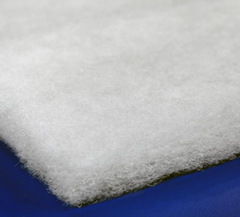
Fiberfill is a lightweight fiber that has been combed and fluffed to form a cotton-like ball. It is usually made from polyester and other recycled materials and used to insulate and pad coats and other garments.
32- French terry knit
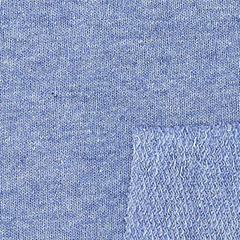
French terry knit fabric is a knitted terry cloth cotton or synthetic fabric that is lightweight and absorbent and features loops and soft piles of yarn on one side and a smooth, soft face on the other.
33- Gaberdine
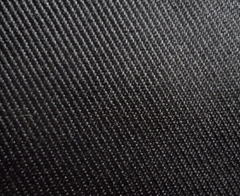
Gaberdine is a durable, tightly woven fabric traditionally made from wool, cotton, texturized polyester, or a blend that is commonly used to make suits, overcoats, trousers, uniforms, and other garments. It typically has a prominent twill weave with a diagonal rib on one side and a smooth face on the other.
34- Hacci sweater knit
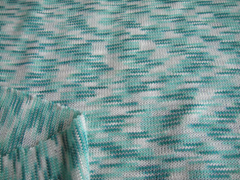
Hacci sweater knit, also known simply as Hacci, is a fabric made from blends of cotton, wool, polyester, or spandex that has a loopy, open-knit texture that is soft and stretchy. It is often used for lightweight sweaters.
35- Hydrophilic Fabric
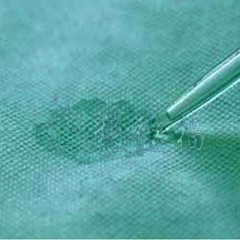
Hydrophilic fabric is a fabric that easily attracts and absorbs liquid.
36- Hydrophobic Fabric
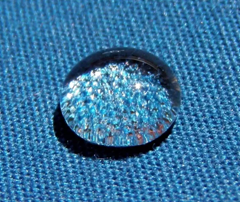
Hydrophobic fabric is a fabric that is constructed to repel water.
37- Interlock knit
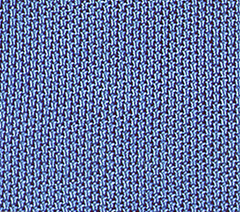
Interlock knit fabric is a variation of rib knit that has two rows of stitches, one directly behind the other, giving the fabric the appearance of having two layers and providing a thicker, heavier, more stable fabric than single knit fabrics.
38- Italian Nylon
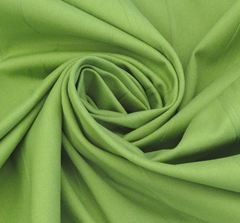
Italian Nylon is a knit fabric made in Italy with a Lycra blend and 4-way stretch to provide stretch, recovery, and abrasion resistance.
39- Jacquard
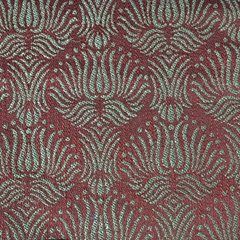
Jacquard fabric is any natural or synthetic fabric that features a raised pattern that is woven (not printed) onto the fabric. Brocade and damask are types of Jacquard fabrics.
40- Jacquard knit
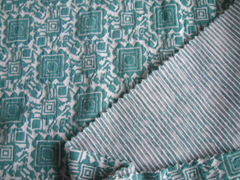
Jacquard knit is a Jacquard fabric that is double-knit.
41- Jersey
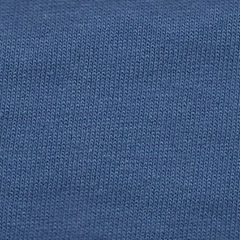
Jersey fabric is a knit fabric with no distinct rib that is made of wool, cotton, or synthetic fibers and commonly used in T-Shirts and tank tops.
42- Jersey Rayon Spandex
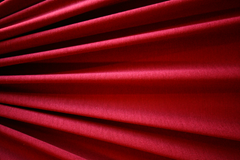
Jersey Rayon Spandex is a Rayon/Spandex blend sewn with a Jersey knit creating a lightweight fabric with a soft, smooth surface and good elasticity.
43- Knit
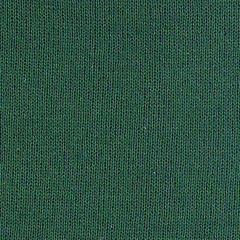
Knitted fabric is a fabric that results from knitting. It is distinct from a woven fabric, where strands typically run straight horizontally and vertically, in that the yarn follows a looped path along its row in which the loops of one row have been pulled through the loops of the row below it. Knitted fabric is durable, flexible, but requires more resources to make. There are two varieties of knit fabric – weft-knit (easier to make but can unravel) and warp-knit fabrics (easy to sew and resistant to runs). Common uses include socks, hats, and T-Shirts.
44- Lace
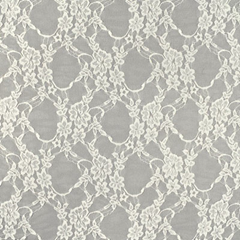
Lace fabric is a delicate fabric made of yarn or thread using a looping or twisted thread to create a web-like pattern in the fabric. It is often made with cotton thread but variants using linen and silk threads are also common.
45- Lame
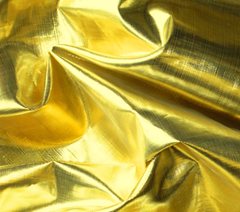
Lame fabric (pronounced lah-may) is a fabric woven or knitted with metallic fibers. The fabric is typically gold or silver, sometimes copper in color. Commonly used in evening dresses and formal wear.
46- Latex
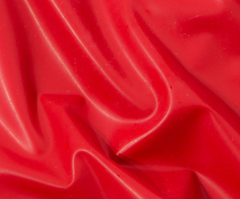
Latex is a rubber-like synthetic sometimes used in fabrics to provide greater elasticity.
47- Linen
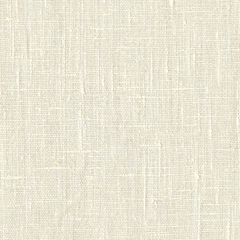
Linen fabric is made using fibers from the stem of the flax plant. Linen fibers are stronger and more lustrous than cotton. Linen is often embedded with synthetic fibers to prevent wrinkling.
48- Lining
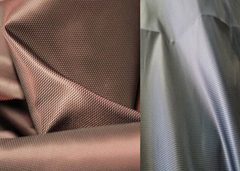
Lining fabrics are natural or synthetic fabrics designed to be sewn into the inside of a garment, typically to make the garment more opaque or to enhance the feel of the piece on the skin.
49- Lycra
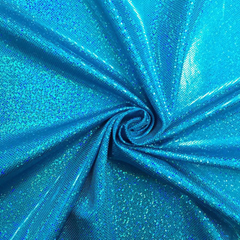
Lycra is a DuPont branded Elastane fabric, a synthetic fabric known for its exceptional elasticity.
50- Lycra Spandex knit
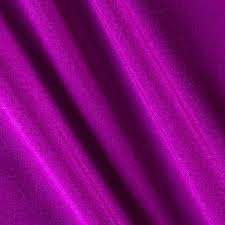
Lycra Spandex knit, also known as dance wear or swimwear knit, is a stretchy fabric blend that has a smooth, shiny face. It is often used for swimsuits, leotards, and leggings.
51- Lyocell
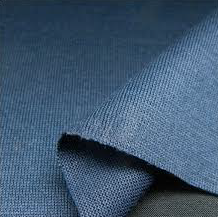
Lyocell, or Tencel, is a type of rayon fabric which consists of cellulose fibers made from dissolving pulp using an organic solvent spinning process. Lyocell is soft, absorbent, resistant to wrinkles, and very strong when wet or dry. It is often blended with natural or manmade fibers such as silk, cotton, rayon, polyester, linen, nylon, and wool.
52- Memory foam

Memory foam is an extruded polyurethane material used to give shape to a garment.
53- Mercerized cotton
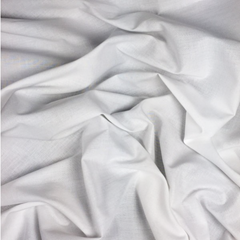
Mercerized cotton fabric is a fabric that has been mercerized to improve dye update, tear strength and reduced shrinkage. Mercerization is a wet finishing process which swells the yarns of the fabric to give it a sheen appearance. The fabric is treated with solutions of sodium hydroxide followed by washing.
54- Merino wool
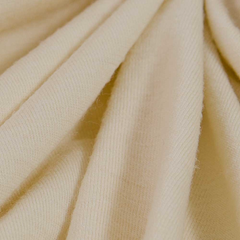
Merino wool is a fabric made from the Merino sheep wool. The fabric is highly regarded for its softness and sheen.
55- Mesh
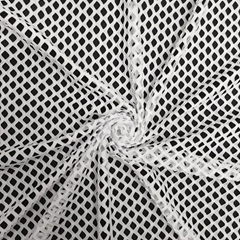
Mesh is any fabric with an open weave that creates a net effect.
56- Micro Modal
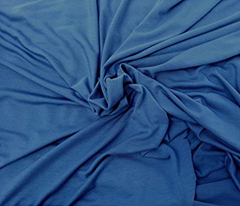
Micro Modal is a variant of Modal textiles that is trademarked fiber from Lenzing (Australia). It is spun from beechwood cellulose and softer than cotton, resists shrinkage, and is moisture wicking.
57- Microfiber
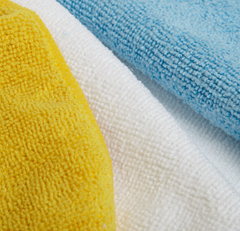
Microfiber fabric is a synthetic fabric made with microfiber, extremely fine fibers (smaller than a strand of silk), typically a blend of polyester or nylon but can also be manufactured from Kevlar or Nomex. Microfiber is very soft, tough, absorbs water well, and has excellent filtering properties. It is typically used to make mats, knits, upholstery, and cleaning cloths.
58- Microfleece
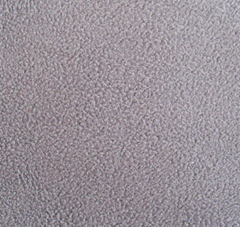
Microfleece is a synthetic fabric, polyester based, with characteristics similar to wool. It is sometimes used to refer to Polar fleece but actually is the name for the thinnest form of Polar fleece and much softer. Microfleece is hydrophobic, retains its insulating quality even when wet, is machine washable, and dries quickly.
59- Modal
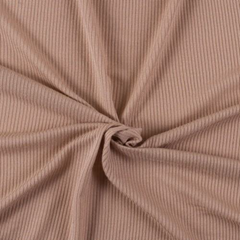
Modal fabric is a type of rayon fabric made from the fibers or the beech tree. Modal fabric resists wrinkles and is easy to care for.
60- Neoprene
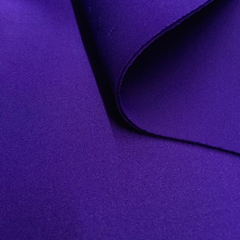
Neoprene fabric is a synthetic rubber fabric. Neoprene is extremely flexible and offers excellent insulation properties. It is often used for outerwear and swimwear.
61- Nylon
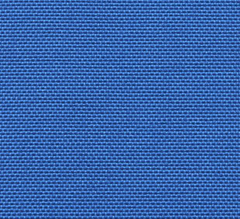
Nylon fabric is synthetic fabric made from a silky thermoplastic material that is melt-processed to form nylon threads. As a substitute for silk, Nylon fabric is flexible and resilient. It’s superior drape and resilience make it a perfect fabric for stockings, scarves, veils, ponchos, socks, gloves, swimsuits, and much more.
62- Panne
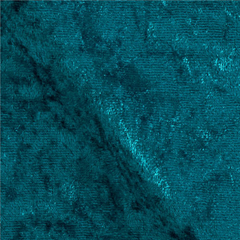
Panne is a type of velvet fabric that has been forced in one direction by heavy pressure to increase its luster.
63- Peau de Soie (or Paduasoy)
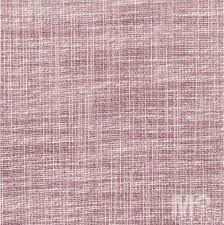
Peau de Soie is type of heavy silk fabric that is woven to create fine cross-ridges across the fabric.
64- Peruvian Pima cotton
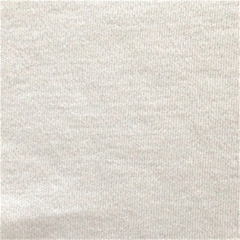
Peruvian Pima cotton fabric is a cotton fabric made from Pima cotton grown in Peru and harvested by hand. Peruvian Pima cotton has long, silky fibers and like Egyptian cotton, is classified as extra-long staple cotton. It has a brilliant white color that can be more easily dyed and is soft, strong, and resists fraying, tearing, piling, wrinkling, and fading.
65- Pima cotton
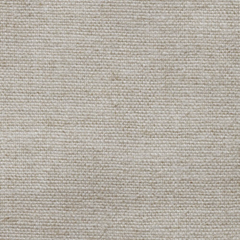
Pima cotton fabric is a fabric made from extra-long staple cotton grown in the US, Australia, and Peru. It is named for the Pima Indians who grow the cotton in Sacaton, Arizona.
66- Pique
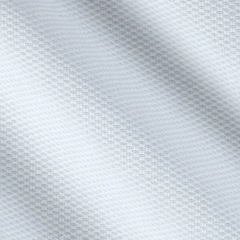
Pique fabric is a medium-weight fabric that has been knitted or woven using the Pique or marcella method. It is normally made from cotton yarn and is characterized by raised parallel cords or geometric designs such as waffle, honeycomb, or birdseye piques. Pique fabric that is woven has cords running lengthwise or in the warp direction. Knitted versions of pique fabric are double-knit construction.
67- Polar fleece
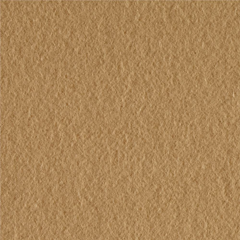
Polar fleece is a type of polyester fleece with two-sided pile. Polar fleece is durable, resist pilling, is hydrophobic, retains its insulating quality even when wet, is machine washable, and dries quickly.. Polar fleece is commonly used in jackets, hats, sweaters, sweatpants, gym clothes, hoodies, blankets and high performance outdoor clothing.
68- Polyamide
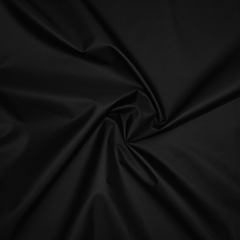
Polyamide fabric is another name for nylon. Polyamide fabric is synthetic fabric made from a silky thermoplastic material that is melt-processed to form nylon threads. As a substitute for silk, Polyamide fabric is flexible and resilient. It’s superior drape and resilience make it a perfect fabric for stockings, scarves, veils, ponchos, socks, gloves, swimsuits, and much more.
69- Polyester
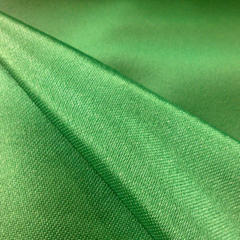
Polyester fabric is made using synthetic polyester yarns or fibers. Polyester, or polyethylene terephthalate (PET) is made by mixing ethylene, glycol, and terephthalic acid to form a type of plastic. Polyester fabric is durable, resistant to chemicals, resists shrinkage and stretching, dries quickly, resists wrinkles and abrasions, is lightweight, and retains its shape and color well.
70- Ponte de roma
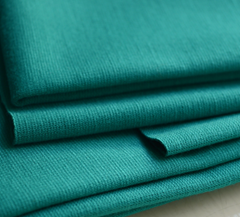
Ponte de roma fabric is a heavy weight, sturdy double-knit fabric that usually has a slight side-to-side texture. It is made from a variety of fibers and yarns but elastane is often included to increase its stretch. Ponte de roma fabric is durable, holds its shape well, and doesn’t crease or cling like other knit fabrics.
71- Powernet
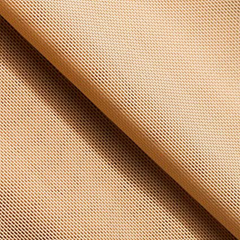
Powernet fabric is a two-way stretch nylon fabric used in compression garments.
72- Rayon
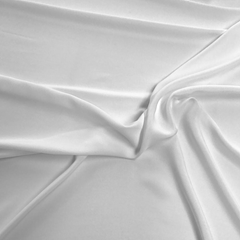
Rayon fabric is a fabric made from wood pulp (typically beechwood) or other vegetable matter. Rayon has a comfortable silk-like feel and absorbs moisture well. It is weaker in strength than cotton and is often used to make delicate, lighter clothing.
73- Rib knit
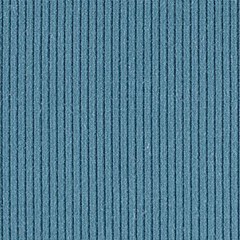
Rib knit fabric is any fabric that is knitted with alternating raised and lowered rows with ridges on both sides of the fabric. Ribbed knit fabric has more stretch and is more durable than plain knits. It is commonly used in T-Shirts.
74- Sanforized
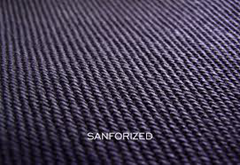
Sanforized fabric is a fabric, usually cotton, that has been manufactured via the sanforization process, a method of stretching, shrinking, and fixing woven cloth. This is done to reduce shrinkage in fabrics prone to shrinking. Fabrics marked as Sanforized indicates shrinkage will be held to no more than one percent.
75- Satin
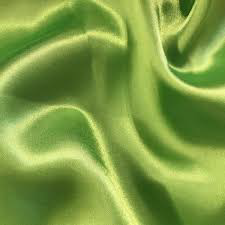
Satin fabric is any silk, polyester, or nylon fabric with a satin weave. It is highly lustrous on one side and dull matte on the other.
76- Silicone
![]()
Silicone fabric is fabric, usually a narrow strip, that is made from silicone, a rubber-like polymer. It maintains elasticity and is often used inside the top of lingerie to make it cling to the skin.
77- Silk
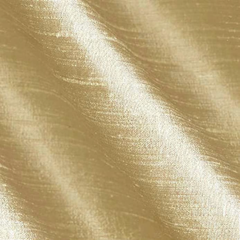
Silk fabric is a natural fabric made from fiber produced by the silkworm.
78- Soy
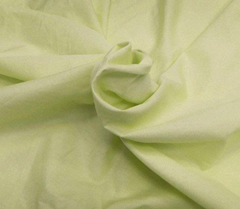
Soy fabric, aka vegetable cashmere, is a fabric made from the hulls of soy beans or leftover dregs from tofu production. Soy fabric is silk-like in texture and easy to care for.
79- Spandex
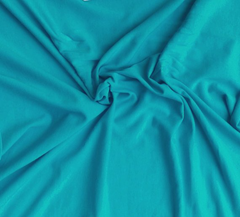
Spandex, the brand name for elastane, is a synthetic fiber made from polyurethane. It is lightweight, elastic, durable, and dries easily.
80- Spanette
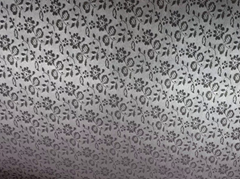
Spanette fabric is a type of woven fabric, typically made from rubber or nylon, that uses dense air holes to provide comfort, breathability, and 360-degree stretch.
81- Stretch lace
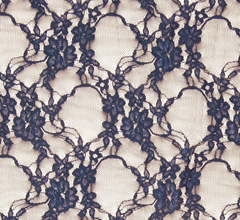
Stretch lace is lace woven to have the traditional web-like pattern while providing stretch.
82- Supima Cotton
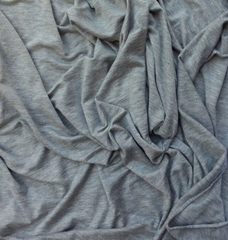
Supima cotton fabric is the licensed name for a American Pima-based cotton fabric.
83- Supplex Nylon
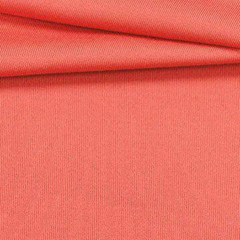
Supplex nylon is a cottony, soft nylon made by DuPont. Supplex nylon is water repellent, wind resistant, and breathable while looking and feeling like cotton-based fabric.
84- Sweatshirt fleece
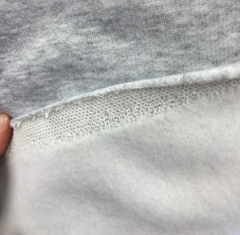
Sweatshirt fleece fabric is a woven fabric, typically cotton or a cotton blend, that feature a smooth face and cozy, brushed back.
85- Tactel
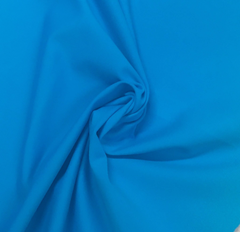
Tactel nylon is a nylon fabric made by DuPont. Like nylon, Tactel is strong, durable, lightweight, quick drying, and resists tearing but is silkier and softer than regular nylon and has a crinkle finish.
86- Tencel
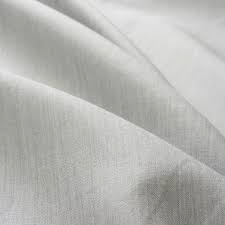
Tencel, a trademarked name for Lyocell, is a type of rayon fabric which consists of cellulose fibers made from dissolving pulp using an organic solvent spinning process. Lyocell is soft, absorbent, resistant to wrinkles, and very strong when wet or dry. It is often blended with natural or manmade fibers such as silk, cotton, rayon, polyester, linen, nylon, and wool.
87- Themastat
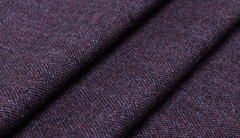
Themastat fabric is a synthetic fabric constructed with hollow-core yarn to assist with heat retention and moisture wicking.
88- Tricot knit
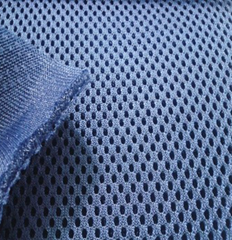
Tricot knit fabric is a very thin, smooth knit fabric constructed from fine or single yarns which form vertical whales on the surface of the fabric and crosswise ribs on the back to create a run-resistant knit fabric that stretches in both lengthwise and crosswise directions. Tricot fabric can be made from cotton, wool, nylon, rayon, silk, and other fibers and is often used for swimwear, sportswear, gloves, and underwear.
89- Velour
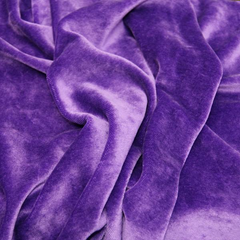
Velour fabric is a plush, knitted fabric with a dense pile providing the rich appearance and feel of velvet. It is typically made from cotton but synthetic materials such as polyester can also be used. Velour fabric offers ease of movement and good heat retention. It is commonly used for leotards and robes.
90- Velvet
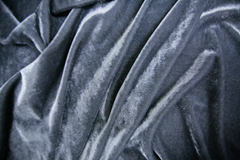
Velvet fabric is a woven tufted fabric with cut threads that are evenly distributed in a short, dense pile giving it a distinct soft feel. Velvet is often made of silk, nylon, acetate, or rayon. Velvet is woven on a special loom that weaves two thicknesses of the material at the same time. The two pieces are then cut apart to create the pile effect, and the two lengths of fabric are wound on separate take-up rolls. Velvet is difficult to clean because of its pile, but modern dry cleaning methods make cleaning more feasible. Velvet pile is created by warp or vertical yarns and velveteen pile (typically made of cotton) is created by weft or fill yarns.
91- Viscose
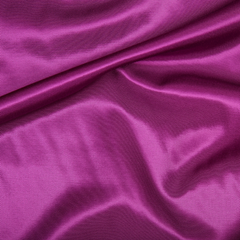
Viscose fabric is the European name from Rayon, a manmade fiber created from cellulose chemically extracted from trees. Viscose has a comfortable silk-like feel and absorbs moisture well. It is weaker in strength than cotton and is often used to make delicate, lighter clothing.
92- Vinyl
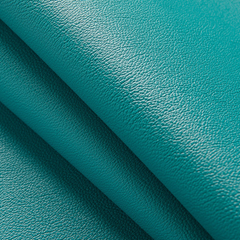
Vinyl fabric is a shiny, plastic coated fabric made with a backing of polyester that is coated with polyvinyl chloride (vinyl) or a blend of PVC and polyurethane.
93- Wool
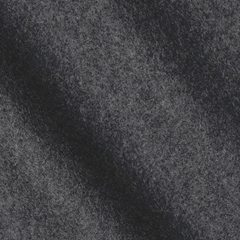
Wool fabric is a natural fiber made from the fleece of sheep, goat, llama, or alpaca. Wool fabric may be knitted or woven.
94- Woven
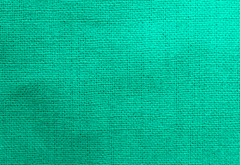
Woven fabrics are any fabrics made from two pieces of yarn that are stretched out over a loom and woven together in both horizontal and vertical directions. Woven fabrics do not stretch because their fibers run at 45-degree angles to one another. Woven fabrics include linen, denim, twill, satin, chiffon, corduroy, tweed, and canvas.
95- X-Static Silver Fiber
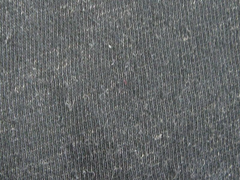
X-Static silver fiber has a layer of pure silver permanently bonded to the surface of a textile fiber. It can be used in knits, wovens, and non-wovens as either a filament or spun yarn. The addition of silver creates an anti-odor, anti-bacterial fiber.


